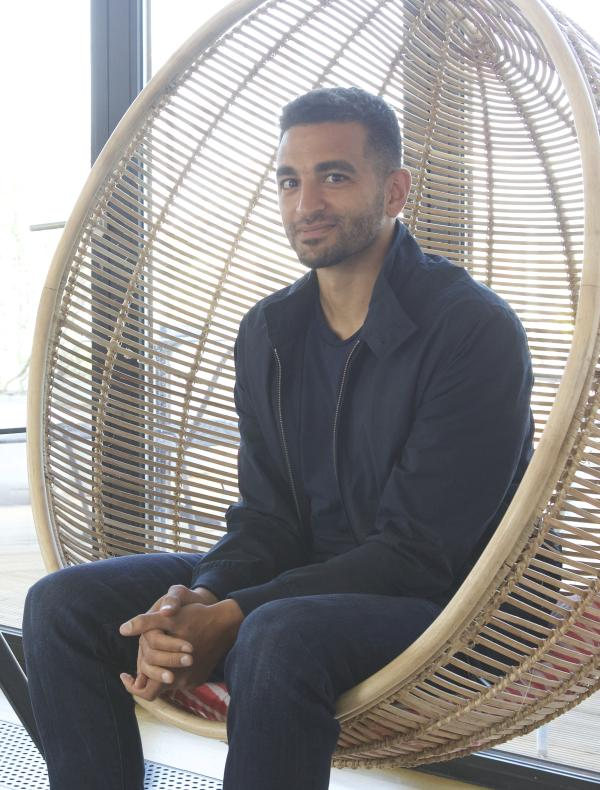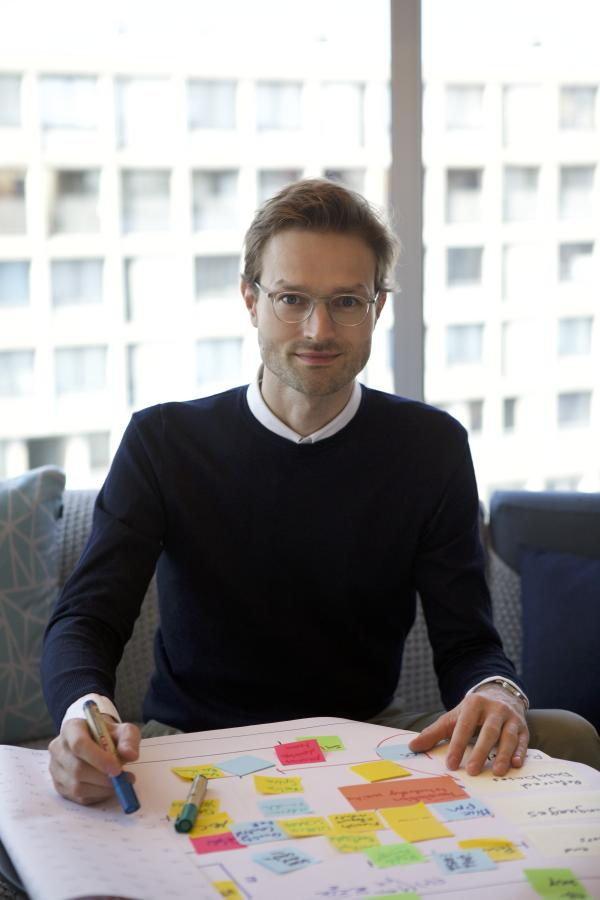Mobile app and smart software improve refugee labour market in a challenging new economy
Refugees and immigrants arrive in a new country with a life’s worth of skills and experience, but often they struggle to demonstrate their talents to employers.
Worse, the newcomers don’t have the local connections and friends who are so important when looking for a new job.

SkillLab, a start-up firm in Amsterdam, wants to “democratise” the career guidance process, as one of the social enterprise’s founders, Karim Bin-Humam, puts it. With a mobile app and software powered by artificial intelligence, the company helps jobseekers identify their skills and shows them how their talents can be used in a new job market. SkillLab signs contracts with governmental employment services and other organisations to improve its service to clients.

Karim Bin-Humam wants to “democratise” the job-finding process for refugees and other people searching for new careers.
Take the story of Omar, who arrived in the Netherlands from Yemen in 2016 with a secondary school diploma. He had worked in retail and real estate in Saudi Arabia but was struggling to find a job in his new home. In 2018, he began volunteering at an animal shelter two days per week while continuing to look for work.
In December 2019, working with the Amsterdam city employment office, he took a skill assessment test with SkillLab’s “SkillMap” app. Together with his case worker, Omar identified the logistics sector as an interesting field that matched his skills and that offered a chance to create a new career. Equipped with application materials and data generated by the SkillMap app, Omar and his case worker approached potential employers.
“The app really helped me to express my abilities in ways that I couldn’t do in previous interviews, because it gave me the time to deeply explore my skills in my native language and present them in the way that I felt was most accurate,” Omar says.
In March, Omar found a full-time job with the United Parcel Service in the Netherlands.
Skills, not titles
“I have always wanted to do something about equality of opportunity,” says Karim Bin- Humam. “A lot of opportunities are based on degrees, universities, job titles that signal a certain brand. People like refugees, without those markers, are often left out in the cold, even when they have valuable skills to offer.”
SkillLab, incorporated in 2018, was one of the finalists in the 2020 Social Innovation Tournament, an initiative run by the EIB Institute to help entrepreneurs tackle society’s problems. SkillLab has won several other awards. It was one of 20 companies to get a grant from Google in 2019 after entering a competition on how artificial intelligence can be used to address society’s challenges.
Not everyone using SkillLab’s software is a refugee. There are also people who’ve lost a job because of new technology, outsourcing and other changes in the labour market. The SkillLab app works in 27 languages, including Arabic. And according to Karim and Christoph Bretgeld, another founder of the company, one of the keys to the success of their system is the use of the word “skills” versus job titles.

Christoph Bretgeld says one of the keys to success of the SkillLab system is the use of the word “skills” rather than job titles.
“A job title in one culture could mean something completely different in another one,” says Christoph. “But skills are easier to translate.”
Christoph says another benefit of the SkillLab approach is that it helps give people a sense of empowerment and dignity in their quest for work.
“Our database has nearly 14,000 skills listed,” he says. “When someone asks you, ‘What are your skills?’ even you and I would struggle to answer that question. But with the A.I. asking the questions, it quickly identifies skills and knows what skills are likely to be associated with other skills.” The app helps people create an accurate presentation of their skills and experiences and can even help them create a professional C.V. in an unfamiliar language.
Growing globally
In the end, jobseekers — including people who have not been working for years — often comment that they hadn’t realized how many skills they had, and that having help in identifying those skills gives them a sense of confidence, Christoph says. With a more complete picture of their areas of competence, these people have a better idea of where to look for work and also what training or education might make them more valuable to employers.
The SkillLab software also helps agencies and organisations make the most of their resources, especially when much work must be done remotely because of the COVID-19 crisis. Karim cites the example of an employment centre in Thessaloniki, where a large number of refugees need help finding work.
“It’s a Herculean task for the work centre with a caseload of 300 to 400 people per month and also dealing with a language barrier because most of the people don’t speak Greek,” Karim says.
In just two years, SkillLab has grown rapidly to a team of 15 with plans to add several more employees in the first months of 2021. The company has contracts in several European cities, as well as the Finnish government and several countries in Latin America. It is also working with the International Labour Organisation, which offers licenses to use the SkillLab to partner organisations in places like Jordan and Egypt.
Christoph says many members of the SkillLab team brought with them experience from volunteer work and were looking for ways to make a bigger impact through technology.
“The topic of work is meaningful because it’s a source of dignity and identity for people,” he says. “We went to help give people a sense of opportunity, perspective, and inclusion.”
